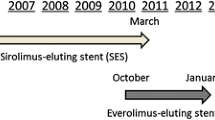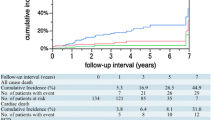Abstract
Background
After successful recanalization of a coronary chronic total occlusion (CTO) the risk for restenosis and subsequent need for repeat intervention is high. Everolimus-eluting stents (EESs) were associated with low rates of restenosis, reintervention and stent thrombosis in non-occluded lesions. We sought to determine the antiproliferative impact of the everolimus-eluting Xience V stent in CTOs.
Methods
Fifty-three patients with a CTO in a native coronary artery were included. CTO was defined as a duration of occlusion ≥3 months and thrombolysis in myocardial infarction 0 flow. EESs were exclusively implanted to completely cover the occluded and adjacent stenotic segments. Dual antiplatelet therapy was prescribed for 6 months. Follow-up angiography was scheduled at 6 months. Clinical follow-up was done at 12 months. The primary endpoint was late loss at the initial occlusion site. Secondary clinical endpoint was a composite of cardiac death, myocardial infarction not clearly attributable to a non-target vessel and target lesion revascularization.
Results
Mean occlusion length was 24 ± 17 mm, ranging from 4 to 74 mm. Mean stent length was 79 ± 36 mm, ranging from 18 to 158 mm. Reference diameter was 3.27 ± 0.58 mm. Late loss at the initial occlusion site was 0.22 ± 0.69 mm. There were six (11%) binary restenosis with a target lesion reintervention in three (6%) patients. There was no death, myocardial infarction or stent thrombosis within 12 months.
Conclusion
In patients with successful recanalization of complex CTOs the use of EESs results in a low angiographic late loss and restenosis rate without stent thrombosis throughout 12 months follow-up.
Similar content being viewed by others
References
Stone GW, Midei M, Newman W, Sanz M, Hermiller JB, Williams J, Farhat N, Mahaffey KW, Cutlip DE, Fitzgerald PJ, Sood P, Su X, Lansky AJ, for the SPIRIT III Investigators (2008) Comparison of an everolimus-eluting stent and a paclitaxel-eluting stent in patients with coronary artery disease: a randomized trial. JAMA 299:1903–1913
Grube E, Chevalier B, Smits P, Džavík V, Patel TM, Mullasari AS, Wöhrle J, Stuteville M, Dorange C, Kaul U, SPIRIT V Investigators (2011) The SPIRIT V study: a clinical evaluation of the XIENCE V everolimus-eluting coronary stent system in the treatment of patients with de novo coronary artery lesions. JACC Cardiovasc Interv 4:168–175
Stone GW, Rizvi A, Newman W, Mastali K, Wang JC, Caputo R, Doostzadeh J, Cao S, Simonton CA, Sudhir K, Lansky AJ, Cutlip DE, SPIRIT IV Investigators (2010) Everolimus-eluting versus paclitaxel-eluting stents in coronary artery disease. N Engl J Med 362:1663–1674
Kedhi E, Joesoef KS, McFadden E, Wassing J, van Mieghem C, Goedhart D, Smits PC (2010) Second-generation everolimus-eluting and paclitaxel-eluting stents in real-life practice (COMPARE): a randomised trial. Lancet 375:201–209
Werner GS, Gitt AK, Zeymer U, Juenger C, Towae F, Wienbergen H, Senges J (2009) Chronic total coronary occlusions in patients with stable angina pectoris: impact on therapy and outcome in present day clinical practice. Clin Res Cardiol 98:435–441
Hoffmann R, Klinker H, Adamu U, Kelm M, Blindt R (2009) The risk of definitive stent thrombosis is increased after ‘‘off-label’’ stent implantation irrespective of drug-eluting stent or bare-metal stent use. Clin Res Cardiol 98:549–554
Werner GS, Krack A, Schwarz G, Prochnau D, Betge S, Figulla HR (2004) Prevention of lesion recurrence in chronic total coronary occlusions by paclitaxel-eluting stents. J Am Coll Cardiol 44:2301–2306
Suttorp MJ, Laarman GJ, Rahel BM, Kelder JC, Bosschaert MA, Kiemeneij F, Ten Berg JM, Bal ET, Rensing BJ, Eefting FD, Mast EG (2006) Primary Stenting of Totally Occluded Native Coronary Arteries II (PRISON II): a randomized comparison of bare metal stent implantation with sirolimus-eluting stent implantation for the treatment of total coronary occlusions. Circulation 114:921–928
Werner GS, Ferrari M, Fritzenwanger M, Betge S, Figulla HR (2007) Long-term safety and efficacy of paclitaxel-eluting stents in chronic total coronary occlusions: 3 year follow-up from the paclitaxel in chronic total occlusion (PACTO) study. Eur Heart J 28(Abstract):135
Rahel BM, Laarman GJ, Kelder JC, Ten Berg JM, Suttorp MJ (2009) Three-year clinical outcome after primary stenting of totally occluded native coronary arteries: a randomized comparison of bare-metal stent implantation with sirolimus-eluting stent implantation for the treatment of total coronary occlusions (Primary Stenting of Totally Occluded Native Coronary Arteries [PRISON] II study). Am Heart J 157:149–155
Di Mario C, Werner GS, Sianos G, Galassi AR, Büttner J, Dudek D, Chevalier B, Lefevre T, Schofer J, Koolen J, Sievert H, Reimers B, Fajadet J, Colombo A, Gershlick A, Serruys PW, Reifart N, for the EuroCTO Club (2007) European perspective in the recanalisation of chronic total occlusions 8CTO): consensus document from the EuroCTO Club. EuroIntervention 3:30–43
Wöhrle J, Birkemeyer R, Markovic S, Nguyen TV, Sinha A, Miljak T, Spiess J, Rottbauer W, Rittger H (2011) Prospective randomised trial evaluating a paclitaxel-coated balloon in patients treated with endothelial progenitor cell capturing stents for de novo coronary artery disease. Heart 97:1338–1342
Herdeg C, Göhring-Frischholz K, Haase KK, Geisler T, Zürn C, Hartmann U, Wöhrle J, Nusser T, Dippon J, May AE, Gawaz M (2009) Catheter-based delivery of fluid paclitaxel for prevention of restenosis in native coronary artery lesions after stent implantation. Circ Cardiovasc Interv 2:294–301
Wöhrle J, Nusser T, Hoffmann S, Kochs M (2009) Angiographic results of the cobalt chromium Vision and Mini-Vision stents. Can J Cardiol 25:581–584
Mehran R, Dangas G, Abizaid AS, Mintz GS, Lansky AJ, Satler LF, Pichard AD, Kent KM, Stone GW, Leon MB (1999) Angiographic patterns of in-stent restenosis: classification and implications for long-term outcome. Circulation 100:1872–1878
Cutlip DE, Windecker S, Mehran R, Boam A, Cohen DJ, van Es GA, Steg PG, Morel MA, Mauri L, Vranckx P, McFadden E, Lansky A, Hamon M, Krucoff MW, Serruys PW, Academic Research Consortium (2007) Clinical end points in coronary stent trials: a case for standardized definitions. Circulation 115:2344–2351
Rubartelli P, Petronio AS, Guiducci V, Sganzerla P, Bolognese L, Galli M, Sheiban I, Chirillo F, Ramondo A, Bellotti S, Gruppo Italiano di Studio sullo Stent nelle Occlusioni Coronariche II GISE Investigators (2010) Comparison of sirolimus-eluting and bare metal stent for treatment of patients with total coronary occlusions: results of the GISSOC II-GISE multicentre randomized trial. Eur Heart J 31:2014–2020
Ge L, Iakovou I, Cosgrave J, Chieffo A, Montorfano M, Michev I, Airoldi F, Carlino M, Melzi G, Sangiorgi GM, Corvaja N, Colombo A (2005) Immediate and mid-term outcomes of sirolimus-eluting stent implantation for chronic total occlusions. Eur Heart J 26:1056–1062
Nakamura S, Muthusamy TS, Bae JH, Cahyadi YH, Udayachalerm W, Tresukosol D (2005) Impact of sirolimus-eluting stent on the outcome of patients with chronic total occlusions. Am J Cardiol 95:161–166
Colmenarez HJ, Escaned J, Fernández C, Lobo L, Cano S, del Angel JG, Alfonso F, Jimenez P, Bañuelos C, Gonzalo N, García E, Hernández R, Macaya C (2010) Efficacy and safety of drug-eluting stents in chronic total coronary occlusion recanalization: a systematic review and meta-analysis. J Am Coll Cardiol 55:1854–1866
Acknowledgments
This work was supported in part by an unrestricted grant by Abbott Vascular GmbH, Germany.
Author information
Authors and Affiliations
Corresponding author
Rights and permissions
About this article
Cite this article
Wöhrle, J., Rottbauer, W. & Imhof, A. Everolimus-eluting stents for treatment of chronic total coronary occlusions. Clin Res Cardiol 101, 23–28 (2012). https://doi.org/10.1007/s00392-011-0359-3
Received:
Accepted:
Published:
Issue Date:
DOI: https://doi.org/10.1007/s00392-011-0359-3




